TABLICA 1. WOL@CIQ RADIUSA. TABLICA 2. WOL@CIQ. ODNIH ZAWISIMOSTEJ OTLI^A@TSQ NEKOTORYE POKAZATELI STEPENEJ, DLQ DRUGIH. DLQ POSTROENIQ KONE^NYH LEMENTOW WYSOKIH STEPENEJ MY NU. SQ W ZNANII OPREDELENNOGO. X nIVNQQ tO^NOE wERHNQQ.
Eurasian Economic Union in the context of the transformation of the international trade system The article is devoted to the issues of the development of the Eurasian economic Union (EAEU) in the context of the crisis of the World Trade Organization (WTO). Transformation processes in the sphere of international trade are determined by the distribution of such forms of cooperation of states as the creation of free trade zones. The authors analyze the prospects of the EAEU in the context of forming free trade areas with states from different regions of the world. Kompleksnaja dolgosrochnaja programma sotrudnichestva v oblasti nauki, tehniki i innovacij mezhdu Pravitel'stvom Rossijskoj Federacii i Pravitel'stvom Respubliki Indii do 2020 goda.
21 dekabrja 2010 goda.[Jelektronnyj resurs]. – Rezhim dostupa: o m p l e k s n a y a - d o l g o s r o c h n a y a - p r o g r a m m a -sotrudnichestva-v-oblasti-nauki-tehniki-i-innovaciymezhdu-pra.html (data poseshhenija: g.). The Eurasian Economic Union in conditions of economic sanctions against Russia:joint efforts coordination in legal reaction of adequate measures development The article focuses on the problems of special economic measures application imposed unilaterally by Member States of the EAEU with the protection of national interests in response to unfriendly actions of third countries. The author, analyzing a number of provisions of the Treaty on the Eurasian Economic Union, comes to the decision about the necessity of conclud-ing a special agreement, which should define the interaction mechanism of the EAEU Member States when applying unilaterally special economic measures by one of the Member States.

Some modern legal processes in the framework of the eurasian legal integration In the article some legal processes in the modern Eurasian economic space and their role in the improvement and development of the legal integration of the economy of the Republic of Kazakhstan in the Eurasian Economic Union have been researched. The questions of the internationalization of the legislation, the legal annihilation, the legal expansion, the reception of law, unification (assimilation) of law, emulation or imitation, penetration and harmonization were examined. The opinions of the famous scholars of the states of the CIS on this problems were compared. Business integration capacity potential in Central Asia In this article is done analyze of the resource potential of the Central Asian countries in the development of economic integration. It was revealed that the existing potential in the areas of trade between these countries underutilized. Studied countries have common characteristics associated with transitivity socio-economic basis, geographical location (not landlocked), and partly the monotony of the structure of exports associated with their economic systems of the past.
It is proposed to ensure mutual market transparency and diversification of trade between the two countries for the efficiency of integration. Challenges the United Nations is facing: can the international community go for reform of the Security Council and the General Assembly? The article analyzes the situation with regard to the reform of the UN Security Council in the current conditions of unstable international situation. How to uninstall websense without password.
The author concludes that the need for flexibility exists, in order to resolve disputes of different Member States and bring together their positions in the successful implementation of UN reform and the transformation of the organization into an effective instrument of world politics and the progressive development of International law. The endless discussion of the international personality of individuals It can be noted that among Russian specialists in the field of international law the supporters of the point of view that the individual becomes the subject of international law appears more often. There is an opinion that the individual is a subject of international law with “a spe-cific character”. There exists a point of view that international law can regulate the relations between private persons but for some reason it does not turn them into subjects of internation-al law. The conception is formulated that the individual can be a subject of only transborder relations but it does not hinder a direct influence of the norms of an international treaty on individuals. These views contradict the fact that international law objectively regulates only in-ter-state relations. The international law of self-defense of states Today, the escalation of military confrontation in Syria means the beginning of a slide into a new «cold war».